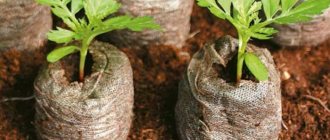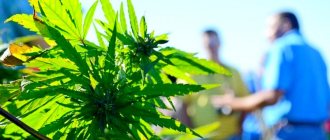It’s possible, but be careful: Mishustin allowed the cultivation of hemp and poppy
— Allow the cultivation of poppy varieties for the production of narcotic drugs and psychotropic substances used for medical purposes and (or) veterinary medicine and the cultivation of hemp varieties and varieties of poppy for industrial purposes not related to the production or manufacture of narcotic drugs and psychotropic substances included in the state a register of breeding achievements approved for use, taking into account the zoning of places where poppy soporific and hemp grow,” the document says.
Poppy can be grown for medicinal purposes “with unlimited content by volume of narcotic drugs and psychotropic substances.” For industrial purposes, hemp can be cultivated with a tetrahydrocannabinol content of no more than 0.1%, and poppy - with a codeine, morphine, oripavine and thebaine content of no more than 0.6%.
The head of the Ministry of Industry and Trade Denis Manturov previously said that 98% of the substances for the production of painkillers are bought abroad. President Vladimir Putin signed a law lifting the ban on the cultivation of narcotic plants for medical purposes in 2022.
Marijuana is the dried tops of the hemp plant with flowers or fruits, which may be accompanied by leaves and seeds of the hemp plant - i.e. without the stem. How many were dug up, how many pieces were counted, that’s how much they charge. In practice, questions about the narcotic activity of seized plants are usually not asked. But the Resolution of the Plenum of the Armed Forces of the Russian Federation dated June 15, 2006, as amended on June 30, 2015, prescribes taking into account the possibility of using substances (and by analogy, plants) for non-medical use. The same is the position of the Constitutional Court: “Courts of general jurisdiction, when resolving this category of criminal cases, must take into account the quantity, properties, degree of impact of a particular narcotic drug on the human body, as well as other circumstances of a particular criminal case” (Determination of February 8, 2007 No. 290- O-P and others).
Article 231 of the Criminal Code provides for liability for the cultivation of narcotic plants “on a large scale”, which for hemp ranges from 20 to 330 plants (over 330 - especially large). For large size - punishment of up to 3 years in prison, that is, this is a crime of minor gravity. Up to 19 plants - Article 10.5.1 of the Administrative Code. Cultivation includes sowing (Article 1 of the Federal Law “On Narcotic Drugs and Psychotropic Substances”). Purchasing seeds is preparation for sowing. 50 cannabis plants is a large size. According to the first part of Article 30 of the Criminal Code, criminal liability arises only for preparation for a serious or especially serious crime. The division of narcotic drugs obtained from hemp, as well as those obtained from poppy, into groups is carried out due to the different content of the active substance - tetrahydrocannabinol - in the drugs of each group. Marijuana contains an average of 0.5 - 5% tetrahydrocannabinol, hashish - 5 - 10%, hashish oil - 10 - 30%. Accordingly, the strength of action of these groups of drugs is different. Therefore, it is important for the investigative authorities and the court to determine in relation to which narcotic drug the illegal actions were committed. Growing up to 19 cannabis bushes entails administrative liability. Article 10.5.1 of the Code of Administrative Offenses implies liability for the illegal cultivation of plants containing narcotic drugs or psychotropic substances or their precursors, unless this action contains a criminal offense. What makes cultivation criminally punishable is not the purpose of cultivation (for storage, consumption), but the number of cultivated plants. The fact that, in addition to cultivation, you possessed marijuana in a criminally punishable quantity cannot be a basis for recognizing other actions as criminal. The decisive thing here is that these plants were not stored, but grown. Up to 19 hemp bushes inclusive - administrative liability under Article 10.5.1 of the Code of Administrative Offenses with punishment in the form of a fine from 1,500 to 4,000 rubles, or administrative arrest for up to 15 days with confiscation of discovered plants. A picked plant or part of it instantly turns from cultivated to stored, for which the liability is different - over 6 grams (after drying) - criminal liability under part one of Article 228 of the Criminal Code. So the law does not consider the exclusively decorative use of the hemp plant a crime, but only an offense.
Growing hemp in a greenhouse
Wooden or metal rods, reinforcement, beams, pipes, boards and even a drywall profile can be used as a frame. The main thing is that it is stable and can hold the cladding material on itself in the event of strong winds or hail with heavy rain.
It has been many years since ready-made greenhouse solutions have appeared on the market. All you need to do is decide on the size. The range is quite wide, and therefore there are greenhouses for any “size”. From small ones for several bushes, to large ones that can accommodate an entire garden. There are special greenhouses for seedlings that can be easily transported, as well as serious standard structures made of metal-plastic, made to order.
The problem of rapidly rising temperatures is probably the most common problem when growing cannabis in a greenhouse. In the summer, with clear skies, it can rise to 40-50 degrees in a matter of hours, which poses a serious danger to cannabis. At first its growth will slow down, and then it will begin to fade.
Hemp greenhouse frame
The frame is an integral part of the greenhouse. It is on this that all the cladding material is attached. This is the skeleton of the structure, which is designed to protect it from falling, sagging and tilting that occur when exposed to the forces of nature. The greenhouse must withstand strong winds, hail and heavy rain, otherwise it promises death for the plants in it.
In general, the process of growing cannabis in a greenhouse is not much different from the indoor method. The only major difference is the presence of a natural light source. It is also easier to deal with high levels of humidity in a greenhouse, because in warm weather you can simply open a door or window for ventilation.
Cannabis cultivation law of Russia 2022
In almost every major city in Russia you can find a grower, dealer or smoker of hemp products. On the one hand, it is prohibited, on the other hand, getting it is not particularly difficult. Varieties and quality vary depending on the manufacturer. Plants may contain different amounts of cannabinoids in regions, but there are several places that have long been known for their quality hashish: Krasnodar region, Buryatia, Altai Mountains, Tuva, Amur region and Volga region, as well as the Far East.
After all, marijuana is a drug that is obtained from Indian hemp. If law enforcement officers have recorded the fact of cultivating marijuana on a large or especially large scale, then the perpetrator faces criminal liability; if in an insignificant amount, then the suspect faces administrative liability.
Article 231 of the Criminal Code of the Russian Federation, which provides for punishment for the cultivation of drug-containing plants, is necessary to prevent the cultivation of such crops for the purpose of consumption or distribution. The commentary to this article explains why people are sentenced under this article.
State policy in the sphere of trafficking in narcotic and psychotropic drugs is aimed at establishing strict control over the distribution and use of these drugs in order to reduce the number of crimes related to the illegal purchase, storage, transportation, and trade of drugs and psychotropic substances.
For growing hemp, from which marijuana is produced, a person can be subject to both administrative and criminal liability. This depends primarily on the amount of marijuana grown. If the act is committed in an insignificant amount, then the person will only be brought to administrative responsibility. This legislative norm is established:
It should also be noted that previously, everyone who tried to recover their personal income tax when purchasing a summer cottage site received a refusal from the tax authorities, since houses located in garden areas did not meet the conditions of the property deduction for the purchase of housing. Now it is quite possible to get a tax deduction.
There should be no garbage on the site - this is one of the main changes. 09.16.2022 - Mikhail Mishustin signed Resolution No. 1479 “On the approval of fire regulations in the Russian Federation” ; it came into force on 01.01.2022. You can punish those summer residents who have grass sprouting in their dacha or garden plot instead of beds. The only concession is that by the beginning of the warm season, it is not at all necessary for everyone to have a fire extinguisher or a barrel of water. But the number of responsibilities of summer residents has increased.
- All driveways must be in good condition so that in the event of a fire you can easily access water sources that can be used to extinguish the fire, for example, a pond (indicated in paragraph 71).
- A barrier or gate should open automatically in case of fire, or manual opening is possible, but only if there is some kind of post that is constantly on duty.
- At the entrance there should be diagrams that indicate entrances, entrances, fire passages and all water sources used during fires.
- If repair or construction work is underway, management is obliged to report the closure of roads and passages, and indicate the detour direction on a special sign (this is paragraph 72).
- If there are natural or artificial reservoirs within a radius of 200 meters, then an access road must also be created to them, a paved road measuring at least 12x12 meters
What is the punishment for using weed?
In addition to punishment for growing hemp, Russian legislation provides for liability for its use. This responsibility is quite mild; the consumer will be punished under the Administrative Code. However, you need to remember that there is criminal liability for possession of marijuana or hemp.
Under the Code of Administrative Offences, the following may be punished:
- Under Article 6.9 for using drugs at home. This will result in a fine of 4-5 thousand rubles or arrest for 15 days. Foreigners will face deportation.
- Under Article 20.20 for consumption in a public place. The punishment is identical to the previous article.
- According to Article 20.22, if a minor used cannabis in a public place. Parents or guardians will be required to pay a fine of 1.5-2 thousand rubles.
Unlike criminal liability for more serious drug-related crimes, administrative penalties are quite mild.
Is it possible to grow hemp at home Russian law 2022
During a personal search of the man, 11 packages containing a substance of plant origin were found in his bag. Based on the results of a chemical study, it was established that the seizure was a narcotic plant - cannabis (marijuana), with a total weight of about 100 grams. The attacker explained that he purchased the prohibited substance from an acquaintance who lived in the house where he was detained.
As a result of further measures, the police found that the apartment in question was rented by a 44-year-old native of Yekaterinburg, who equipped the balcony as a specialized greenhouse where he grew hemp. During the inspection, 46 vacuum bags with a substance of plant origin were found in the freezer compartment of the refrigerator, as well as a bucket with a similar substance and 7 pots with hallucinogenic plants. According to the results of a chemical study, it was revealed that the seized drug was a narcotic drug - marijuana, with a total weight of about 600 grams. In addition, investigators found items necessary for the cultivation of hemp, scales, a device for vacuum packaging and plastic bags.
Employees of the Directorate for Drug Control of the Main Directorate of the Ministry of Internal Affairs of Russia for the Moscow Region, together with colleagues from the Regional Directorate of the Ministry of Internal Affairs of Russia for the city. Podolsk as a result of operational search activities at the entrance of an apartment building on the street. The 43rd Army detained a 52-year-old resident of the city. Mytishchi, suspected of illegal acquisition of narcotic drugs.
A criminal case has been initiated against one of the detainees under Art. 30, art. 228.1 of the Criminal Code of the Russian Federation (Attempt at illegal production or sale of narcotic drugs, psychotropic substances or their analogues), in relation to another - under Art. 228 of the Criminal Code of the Russian Federation “Illegal acquisition, storage, transportation, production, processing of narcotic drugs, psychotropic substances or their analogues.”
The bill also addresses the issue of regulating controversial issues related to the cultivation of narcotic substances, but to meet the needs of the food industry. The document says, in particular, that the state currently purchases 100% of such raw materials abroad, which is an average of 10 thousand tons of products per year. The right to cultivate such plants is also granted to federal state unitary enterprises that have the appropriate license. Requirements for varieties and cultivation conditions will be put forward, according to one of the provisions of the bill, by the Government of the Russian Federation.
- The adoption of amendments to the law is associated with the need to implement V.V. Putin’s Decree No. 598 of 05/07/2012. The President, in particular, pointed out the need to take measures that would allow increasing the amount of domestic medicines necessary for the life support of Russians to 90%.
- The explanatory note also states that currently 13 drugs containing narcotic substances are produced in Russia, nine of which are considered vital. Some of these drugs are imported, and the raw materials are 100% produced by foreign companies. This market is controlled by 10 states, nine of which are under the jurisdiction of states that support the sanctions policy.
- The deputies believe that this situation requires fundamental changes, and this need arises in connection with the need to ensure the national security of the country, which has become dependent on Western “partners.”
- Legislators have proposed a solution that will allow organizing a full cycle of production of medications based on cannabis, sleeping pills poppy and other narcotic crops.
- According to the new rules, oilseed or opium poppy (Papaver somniferum L), which contains a large number of alkaloids, will be grown. According to the new law, Russian enterprises will be able not only to grow this valuable crop, but also to produce vital medications from poppy straw.
If Russian history had turned out differently, perhaps it would be hemp, and not hydrocarbons, that would be called a national treasure today. In the current circumstances, this would be very useful, given the situation with oil prices. But it turned out the way it turned out. If we once ranked first in the world in hemp crops, now Russia accounts for about 1%. And China has become the leader in this area. Its rapid economic growth proves that they know what they are doing. And all this despite the fact that the attitude towards drugs in the Middle Kingdom is far from liberal. They wouldn’t get involved with hemp farming if they saw it as a threat to the nation.
- Article 10.5.1. “Illegal cultivation of plants containing narcotic drugs or psychotropic substances or their precursors” of the Code of Administrative Offenses;
- amendments to the Federal Law of May 19, 2010 No. 87-FZ “On amendments to certain legislative acts of the Russian Federation on the issue of cultivation of plants containing narcotic drugs or psychotropic substances or their precursors.”
Mentioned in the document Federal Law No. 3 of 01/08/1998, which prohibits the cultivation in Russia of plants containing prohibited substances. The deputies called for the provisions of this law to be repealed, and noted that there should be a state monopoly on the cultivation of drug-containing flora, and their cultivation for the needs of medicine and veterinary medicine should be carried out in compliance with legal norms and regulations.
How many bushes can be grown according to Russian law in an apartment?
Cannabis is viewed negatively in Russia - for decades, anti-drug propaganda has formed the impression among our fellow citizens that the plant is of interest exclusively to drug addicts, and simply cannot be used in any other way. However, perhaps this will cause considerable surprise for some readers, but the legislation of the Russian Federation is not so clear about the cultivation of this weed, and in this article we will look at how many hemp bushes can be grown in Russia by law, and what is needed for this.
Potential benefits from industry development
Is everything really forbidden? Let's talk about seeds...
Today, this weed in Russia has the status of a raw material for narcotic drugs; accordingly, the circulation of such drugs is under the control of the government. Cannabis-based medications are not used in domestic medicine, and citizens cannot legally use, store and sell; there are also restrictions and issues of growing for one’s own needs, as well as cultivation - all this cannot be done.
On the other hand, the seeds were not banned; on the basis of the international anti-drug convention, to which the Russian Federation joined, the seeds were brought into the legal realm, since they do not contain tetracannabinol, which causes certain psycho-emotional effects. The seeds are freely available, as are derivatives based on them, for example, oil can be bought at a pharmacy - this is a good dietary supplement that helps with various diseases, and the grains are sold in pet stores and are used as bird feed. Making tinctures and cosmetic masks at home is also not a violation. Export is also not prohibited, and many varieties come to us from countries where they are legally cultivated.
What will happen if...?
But if you suddenly want to use these grains as seed, then you need to know that such actions are discussed in Art. 231 of the Criminal Code of the Russian Federation. Accordingly, preventive measures are provided for this - from a fine (1500 rubles - 4000 rubles) to imprisonment, depending on the volume and other circumstances.
For example, if a few bushes are found on the site (up to twenty), the punishment will be imposed within the framework of administrative liability, and if a small plantation is discovered (twenty or more), then criminal liability will be imposed, namely, isolation from society for up to two years.
It is possible, but subject to conditions. Licensing and inspections
However, on the other hand, even in modern legislation there are indications of varieties that are permissible to grow, that is, under appropriate circumstances this can be done. There are several dozen technical subtypes, where the THC content is reduced to almost zero; they cannot be used to obtain various products that can cause any effects in terms of emotional or mental impact.
Naturally, in addition to documents, it is really necessary to create special conditions - to provide security, fence the perimeter, and maintain strict reporting on harvests and supplies. Domestic businessmen who work in this direction often encounter bias from regulatory authorities, who in some cases try to substitute tests, thereby causing a lot of trouble. By the way, as a result of the actions of his own employees (who may sow part of the area with the “wrong” variety), the farm owner may seriously suffer.
And a little about selection
Cultivation - the breeding of varieties that meet certain characteristics, is also allowed, of course, only within specialized research institutes; several large agricultural institutes in different cities were inherited from the Soviet era. But if you suddenly decide to justify the presence of several “weeds” in your yard for purely research purposes, then you must have documents stating that you have the right to conduct such activities. Otherwise, the thirst for knowledge will quickly be reclassified as an act described in the Criminal Code.
World practice. How is this going abroad?
The leading country in this regard is China - it has fairly strict legislation, which has made it possible to minimize consumption among the population. At the same time, in two regions at once there are industrial crops and dozens of private farms that are licensed and earn good money (this is more profitable than planting rice). By the way, the Celestial Empire has actually managed to capture the market for “medicinal marijuana,” which is exported and is also used to manufacture numerous medications within the state (for domestic needs and for export).
They do this in the Netherlands too, however, the focus here is completely different, the product is mainly for sale within Europe and is intended, let’s say, for relaxation. It is allowed to consume marijuana here, but there are quite a lot of restrictions - you can’t sell it to minors, you can’t smoke in public places, there are specially designed “coffee shops” for this, where you can buy everything you need.
By the way, in many European countries, citizens are given the opportunity to have a few plants in their yard or on their windowsill without persecution or any consequences.
In the United States, perhaps, there is the most ambiguous attitude towards the subject. In some states, you can do everything - use, plant and carry with you; in a number of territorial entities only technical or medical varieties are welcome, and in some places everything related to hemp is prohibited.
The amazing is nearby: the Uruguayan example
But joint cultivation of hemp is also allowed; for this purpose, it is permissible to unite in groups and conduct collective farming. The authorities were prompted to make this decision by the idea that legalization would lead to the absence of a criminal component in circulation. The cost of a serving is just over a dollar, which is much cheaper than before, dealers have left the streets, and criminals have lost a significant part of their profits, which went to finance other illegal projects.
Conclusion
So, what's the bottom line? In fact, for now all manipulations with grass can only be carried out in specialized enterprises; private individuals cannot even get close to this area; doctors are also deprived of advantages. The chances of a quick lifting of restrictive acts tend to zero, which is confirmed by government policy. As the President recently stated, he is not against technical exploitation, but the use of the plant as a drug for general consumption (for therapeutic purposes or for relaxation) is unacceptable.
This article was prepared with the support of the GrowerZ store
Source
Opponents of the legalization of cannabis still consider it a kind of bridge between normal life and the use of hard drugs. Now the reverse process is gradually taking place. A number of states have fully or partially legalized marijuana and its products. Let's take a closer look at what responsibility is provided for growing marijuana in our country?
Is it possible to grow hemp at home Russian law 2022
The State Duma has allowed the cultivation of marijuana and opium poppy in Russia. We are talking about the cultivation of plants for the production of narcotic drugs, but only in the interests of medicine and veterinary medicine. Deputies adopted the corresponding amendments to Article 228.2 of the Criminal Code today, July 23, in the third reading. The amendments were needed after amendments were made to the law “On Narcotic Drugs and Psychotropic Substances,” which were adopted back in June.
This is not the first time that the use of cannabis for medical purposes has been discussed. In January of this year, the Ministry of Health proposed allowing the import of several of its derivatives into Russia. In some countries it is used to relieve chronic pain, treat cancer, psychosis and anorexia in HIV-positive people. Opium poppy is also used to produce codeine. Medicines containing codeine began to be sold by prescription in Russia only in 2012 - before that, even a child could easily buy drugs such as Pentalgin, Codelac and Nurofen Plus. Currently, 13 opium-based drugs are produced in the country.
Self-cultivation of drug-containing plants will still remain illegal: the most “popular” article has been rewritten only for doctors. But they will also be able to use this right not without restrictions: penalties are provided for violating the rules for the production and circulation of narcotic drugs. The minimum is a fine of up to 120 thousand rubles, the maximum is up to 3 years in prison. The latter threatens if the court manages to prove that the criminal was motivated by self-interest or that his action affected a person’s health.
Criminal liability for illegal cultivation of cannabis
A crime is committed with clear intent because the perpetrator is aware of the consequences of his actions and desires them to occur. The purpose of cultivation does not affect the qualification of the violation. Responsibility is inevitable, even if the plants were intended for personal use (find out if there is an article for drug use here).
Federation, which presents a list of psychotropic and narcotic substances and their precursors (“precursors” that take part in the reaction to form the final product), the circulation of which is prohibited in the country. The list of drugs includes 4 main groups:
An interesting incident occurred in the Krasnodar region. The citizen was fond of growing cacti of various types and suddenly came under the close attention of the drug police. And all because in his collection there was a cactus called Lophophora Williams, which contained narcotic substances. The police pursuit ended only after it became clear that there was only one cactus and it would not cause any harm. And responsibility comes when growing more than 2 copies.
In a state of drug intoxication after consuming marijuana, the perception of things changes: colors become brighter, individual sounds merge into music, food becomes even tastier, etc. The passage of time slows down or, on the contrary, accelerates, social activity increases - a person becomes sociable and talkative.
“It grows everywhere. Mom weeds the garden, but leaves the poppy: “It’s a pity for the flowers.” In the beds, in the middle of the onions. The soil in the greenhouse was not dug up this year; everything was overgrown with poppies. Mom said: “Let the flowers grow,” and this is what the flowers turned out to be. Instead of grass, she threw it to goats, chickens, and geese,” explains Sophia.
Is it possible to grow hemp at home Russian law 2022
During a personal search of the man, 11 packages containing a substance of plant origin were found in his bag. Based on the results of a chemical study, it was established that the seizure was a narcotic plant - cannabis (marijuana), with a total weight of about 100 grams. The attacker explained that he purchased the prohibited substance from an acquaintance who lived in the house where he was detained.
As a result of further measures, the police found that the apartment in question was rented by a 44-year-old native of Yekaterinburg, who equipped the balcony as a specialized greenhouse where he grew hemp. During the inspection, 46 vacuum bags with a substance of plant origin were found in the freezer compartment of the refrigerator, as well as a bucket with a similar substance and 7 pots with hallucinogenic plants. According to the results of a chemical study, it was revealed that the seized drug was a narcotic drug - marijuana, with a total weight of about 600 grams. In addition, investigators found items necessary for the cultivation of hemp, scales, a device for vacuum packaging and plastic bags.
Employees of the Directorate for Drug Control of the Main Directorate of the Ministry of Internal Affairs of Russia for the Moscow Region, together with colleagues from the Regional Directorate of the Ministry of Internal Affairs of Russia for the city. Podolsk as a result of operational search activities at the entrance of an apartment building on the street. The 43rd Army detained a 52-year-old resident of the city. Mytishchi, suspected of illegal acquisition of narcotic drugs.
A criminal case has been initiated against one of the detainees under Art. 30, art. 228.1 of the Criminal Code of the Russian Federation (Attempt at illegal production or sale of narcotic drugs, psychotropic substances or their analogues), in relation to another - under Art. 228 of the Criminal Code of the Russian Federation “Illegal acquisition, storage, transportation, production, processing of narcotic drugs, psychotropic substances or their analogues.”
In the Russian Empire, revenues from the sale of hemp to the world market constituted a significant part of the state budget. They say that almost the entire rigging of the fleet of the “Queen of the Seas” of Great Britain consisted of Russian hemp. During the 1930s, the USSR still produced the majority of the world's industrial hemp. It was used for ropes and tarpaulins, drying oils and paints, oils and cosmetics, paper and threads. The plant was unpretentious, and the industry was considered extremely profitable.
What is the deadline for selling hemp seeds?
The seller of seeds of prohibited varieties of cannabis will be punished more harshly than the buyer. Article 228.1 of the Criminal Code of the Russian Federation provides for imprisonment for 4-8 years with an additional restriction of freedom for 1 year.
However, there are aggravating circumstances:
Have a question for a lawyer? Ask now, call and get a free consultation from leading lawyers in your city. We will answer your questions quickly and try to help with your specific case.
Telephone in Moscow and the Moscow region: +7
Phone in St. Petersburg and Leningrad region: +7
Free hotline throughout Russia: 8 (800) 301-39-20
- Sales to educational institutions, public and government institutions, recreational facilities, transport and correctional institutions.
- Use for selling media and information networks.
In these cases, the term of imprisonment will be assigned within the range of 5-12 years, with a possible additional fine of 500 thousand rubles and a year of restriction of freedom.
Trafficking by a group of people, as well as the significant amount of THC in the seeds, is also an aggravating factor. This is punishable by imprisonment for up to 15 years with a limit of up to 2 years.
Use of official position, as well as large and especially large amounts of THC content can lead to a 20-year prison sentence, a fine of one million rubles, as well as an additional ban on working in a specific area for 20 years.
Rooster in the country
But local courts, as it turns out, make diametrically different decisions on similar issues in different regions. So the decision of the Constitutional Court concerns not only the person who did not agree with the established practice and reached the Constitutional Court. And there he asked to check the law, with which he did not agree. Both the highest court of the country and its judges, having studied the issue, said that the person posed the problem correctly.
For the decision of the Constitutional Court, which Rossiyskaya Gazeta published on Wednesday, citizens should thank Chita resident Margarita Antsinova. It was she who asked to check Article 8.8 of the Code of Administrative Offenses of the Russian Federation. Article 8.8 provides for punishment for using a land plot for purposes other than its intended purpose.
Margarita Antsinova was fined 10 thousand rubles for raising goats, ducks and rabbits on her land, although her plot, like neighboring plots, was intended only for housing construction.
Antsinova was unable to challenge the punishment: the courts referred to the fact that “the choice of any type of permitted use of a land plot must be formalized in the manner prescribed by law, and therefore an actual change by the owner of the permitted types of its use is impossible without notification in the Unified State Register of Real Estate.”
The materials of her court case say that only documentation of the choice of an auxiliary type of use of the land plot, despite the fact that this type is provided for by the territorial zone “Zh-3”, allows the owner to legally exercise the rights provided for by the Town Planning and Land Codes of the Russian Federation.
But Margarita Antsinova herself is confident that on her land “there is a possibility of erecting buildings for keeping livestock and poultry (an auxiliary use). As a result, she has the right to independently choose any type of permitted use, including auxiliary, without additional permits and approval procedures.”
The judges of the Constitutional Court said that the existing law enforcement practice in such cases is ambiguous. And this, in turn, entails uncertainty in the issue of the possibility of bringing the owner to administrative responsibility for using a land plot not for its intended purpose. Interestingly, the authorized representatives of the authorities in the Constitutional Court also disagreed on this issue. Thus, representatives of the chambers of the Federal Assembly insisted that the types of permitted use of the site should be determined based on the provisions of urban planning regulations. On the contrary, the plenipotentiary representative of the President of the Russian Federation said that the right to choose does not replace the owner’s obligation to enter information into the register.
Sergey Knyazev , judge of the Constitutional Court of the Russian Federation:
The legislator could establish the right of the land user to independently choose an auxiliary type of permitted use of the site.
But having chosen one or the other option, the rules must be formulated so that everyone understands what to do.
If we compare not only land, but also town planning and registration legislation, it is impossible to confidently extract from there the answer to the question of whether it is necessary or not necessary to enter information into the Unified State Register of Real Estate in such a case.
Source
Growing marijuana - article
How many marijuana plants can you grow to avoid criminal penalties? The answer to this is clear - less than 20 bushes, since this size is not considered large. Moreover, this rule was introduced recently; previously, any illegal cultivation of hemp led to criminal liability. With the adoption of Federal Law No. 87-FZ of May 19, 2010, changes were made to various legislative acts in the field of cultivation and cultivation of plants containing drugs. Growing them was decriminalized, but cultivation was not. Cultivating plants means caring for them in order to obtain maximum benefit. Cultivation does not necessarily imply benefits.
If you can prove that the plants were grown, for example, for aesthetic purposes, there is a chance to evade criminal liability.
If this action does not fall under the articles of the Criminal Code of the Russian Federation, the person will only bear administrative liability under Art. 10.5.1 Code of Administrative Offenses of the Russian Federation. Punishment is provided in the form of a fine for citizens in the amount of 1.5 to 4 thousand rubles. Instead of a fine, a person may be arrested for up to 15 days. Legal entities will pay a fine of 100 to 300 thousand rubles.
If you need help with arrest on suspicion of growing marijuana, consult our experienced lawyers by calling the numbers provided or using the feedback form.









